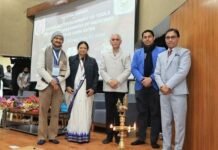September 13
384 drugs have been included in this list with the addition of 34 drugs, while 26 from the previous list have been dropped. The medicines have been categorized into 27 therapeutic categories.
While launching the National Lists of Essential Medicines (NLEM) 2022, Union Minister for Health and Family Welfare Dr. Mansukh Mandaviya said, ‘Union Health Ministry is taking various steps under the vision of Prime Minister Narendra Modi ji towards Sabko Dawai, Sasti Dawai. In this direction, the National List of Essential Medicines (NLEM) plays an important role in ensuring the accessibility of affordable quality medicines at all levels of healthcare. This will give a boost to cost-effective, quality medicines and contribute towards reduction in Out of Pocket Expenditure on healthcare for the citizens.”
The “essential medicines” are those that satisfy the priority health care needs, based on efficacy, safety, quality and total cost of the treatment. The primary purpose of NLEM is to promote rational use of medicines considering the three important aspects i.e., cost, safety and efficacy. It also helps in optimum utilization of healthcare resources and budget; drug procurement policies, health insurance; improving prescribing habits; medical education and training for UG/PG; and drafting pharmaceutical policies, Union Minister added.
In NLEM, the medicines are categorized based on level of healthcare system as-P- Primary; S- Secondary and T- Tertiary.
He added that the NLEM is a dynamic document and is revised on a regular basis considering the changing public health priorities as well as advancement in pharmaceutical knowledge. The National List of Essential Medicines was first formulated in 1996 and it was revised thrice earlier in 2003, 2011, and 2015.
“The independent Standing National Committee on Medicines (SNCM) was constituted by Union Health Ministry in 2018. The Committee after detailed consultation with experts and stakeholders has revised the NLEM, 2015 and submitted its report on NLEM, 2022 to the Ministry of Health & Family Welfare. The Government of India has accepted the recommendations of the Committee and adopted the list”, he stated.
He also noted that the process of creation of NLEM depends on the feedback backed by scientific sources from stakeholders and inclusion/exclusion principle followed.



























